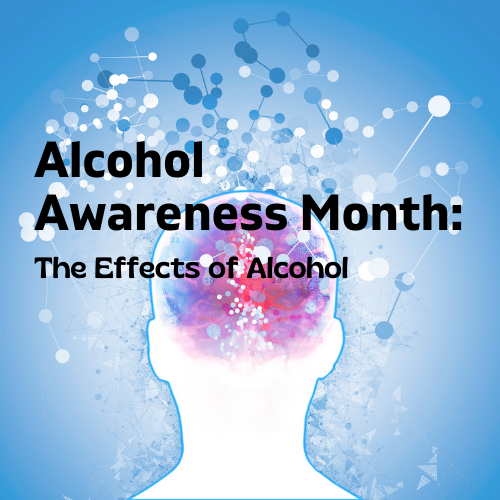
Alcohol Awareness Month: The Effects of Alcohol
How did Alcohol Awareness Month start?
April is Alcohol Awareness Month and we will explore the effects of alcohol. Many years ago it was created to help reduce the stigma around alcoholism and to encourage those with a substance use disorder to consider treatment. In spite of most everyone knowing alcohol isn’t healthy; people regularly consume alcohol on a regular basis. But why does it work the way that it does, and how does it affect our health?
The physical effects of alcohol
Many people believe that alcohol is a stimulant, whereas it is actually a depressant. This is because alcohol slows down our cognitive abilities and functions. For example, a person would have impaired balance, slurred speech and lower reaction times. Alcohol can severely affect brain development in growing adolescents. This is why those who begin drinking at a younger age are more likely to develop alcohol use disorders.
The neurological effects of alcohol
Alcohol disrupts the neurotransmitters in our brain. Most depressants slow our heart rate and respiratory system by using the neurotransmitter GABA (inhibitory neurotransmitter). Alcohol at inhibits glutamate, the excitatory neurotransmitter that would do the opposite of GABA by increasing our energy level and activity. However, the reason that many people believe that alcohol is a stimulant is because it releases a third neurotransmitter called dopamine. Dopamine is our reward system’s neurotransmitter. It makes us feel good and is the reason many might continue to drink. When people drink alcohol in the short term it is more heavily likely to produce inhibitory responses, but after long term exposure the brain tries to compensate and bring the brain back to equilibrium, which is why the effects of alcohol on your system after sustained drinking might change over time.
Other effects of alcohol
Many people might drink to reduce their anxiety or stress. However, it usually makes them worse. People can become psychologically or physically dependent to it. Symptoms of psychological dependence is when you exhibit seeking behaviors for repeated use and might even put yourself in bad situations you would not have otherwise done; these types of symptoms are more often exhibited through behavior. Being physically dependent is more physiological and is characterized through withdrawal symptoms like anxiety, depression, shaking, headaches or vomiting.
Treatment Options
Lifeline Connections commits to long-term wellness for our patients. For example, we offer an integrated, holistic approach that includes substance use disorder treatment, therapy and case management. Our doctors specialize in the treatment of co-occurring mental health and substance use disorders, working to solve ones that have a compounding effect. Contact us and reclaim your life.
Contact a doctor for a referral or find a therapist. They can work to design a custom plan for wellness. Secure treatment is over the phone or computer with telehealth, providing coping skills for grief, loss, depression and anxiety. Moreover, they will work with you one-on-one to get you feeling better.
